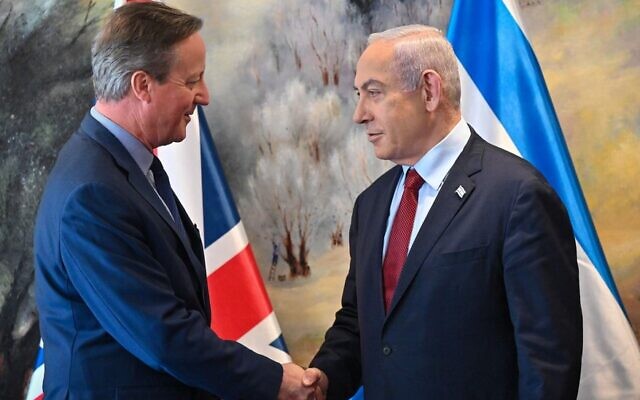Cameron to push for ‘urgent humanitarian pause’ in Gaza war on Middle East visit
Lord David Cameron will raise concerns about the high number of civilian casualties in talks with Netanyahu and push for water, electricity and fuel to be restored.
The Foreign Secretary will visit the Middle East to call for an “urgent humanitarian pause” in the Gaza war as fighting intensifies and tensions heighten in the region.
Lord David Cameron will raise concerns about the high number of civilian casualties in talks with Israeli Prime Minister Benjamin Netanyahu and push for water, electricity and fuel to be restored.
More crossing points need to be open for longer for aid deliveries to Gaza, including the port at Ashdod and the Kerem Shalom crossing, he is expected to say in his meetings.
Efforts to secure the safe release of hostages still held by Hamas will also be high on Lord Cameron’s agenda in talks with regional leaders as he presses the cases of British and dual nationals through as many diplomatic channels as possible.
In a meeting with Palestinian president Mahmoud Abbas, the Foreign Secretary will highlight the UK’s long-term support for a two-state solution to the conflict.
During a visit to Qatar – a key mediator in the conflict – Lord Cameron will meet counterparts to discuss how they can work with the UK more closely to do more to address regional instability.
The Foreign Secretary will also meet Turkish government leaders to discuss the security situation alongside other shared challenges including terrorism, migration and shoring up support for Nato and Ukraine.
Lord Cameron said: “No-one wants to see this conflict go on a moment longer than necessary. An immediate pause is now necessary to get aid in and hostages out. The situation is desperate.
“This week I am in the Middle East working with partners to help build a plan to move from that pause to a sustainable, permanent ceasefire without a return to hostilities.
“Such a plan would require Hamas to agree to the release of all hostages, Hamas to no longer be in charge of Gaza launching rocket attacks at Israel, and an agreement in place for the Palestinian Authority to return to Gaza in order to provide governance and services and, increasingly, security.”
It comes as the Israeli military said 21 soldiers were killed in the Gaza Strip in the deadliest attack on its forces since the October 7 Hamas raid that triggered the war.
Hours later, the military announced that ground forces had encircled the southern city of Khan Younis, Gaza’s second largest, where dozens of Palestinians have been killed and wounded in heavy fighting in recent days.
Mr Netanyahu mourned the soldiers but vowed to press ahead with the offensive until “absolute victory” over Hamas was achieved.
The attack is a major setback that could add to mounting calls for a ceasefire.
Israel launched its offensive after Hamas crossed the border in October, killing more than 1,200 people and abducting some 240 others.
The country’s military campaign has been one of the deadliest and most destructive in recent history, displacing an estimated 85% of Gaza’s population and leaving more than 25,000 Palestinians dead, according to health officials in the Hamas-run territory.
The United Nations and international aid agencies say the fighting has caused a humanitarian disaster, with a quarter of Gaza’s 2.3 million people facing starvation.
Israel has come under mounting pressure to rein in its offensive as the number of civilian deaths rises, and Mr Netanyahu drew criticism after rejecting Palestinian sovereignty as part of any post-war plan.
He has said his country needs full security control over the Palestinian territories in remarks described as “disappointing” by the UK Government and “unacceptable” by Labour leader Sir Keir Starmer.
The war has heightened regional tensions, with Iran-backed groups in Lebanon, Syria, Iraq and Yemen launching attacks they say are in support of Palestinians.
Britain and the US launched another wave of strikes on Monday against the Houthi rebels in Yemen, who have targeted international shipping in the Red Sea in what they portray as a blockade of Israel.
Prime Minister Rishi Sunak has said the UK would not hesitate to take further action against the Iran-backed group if attacks on shipping continued.

Thank you for helping to make Jewish News the leading source of news and opinion for the UK Jewish community. Today we're asking for your invaluable help to continue putting our community first in everything we do.
For as little as £5 a month you can help sustain the vital work we do in celebrating and standing up for Jewish life in Britain.
Jewish News holds our community together and keeps us connected. Like a synagogue, it’s where people turn to feel part of something bigger. It also proudly shows the rest of Britain the vibrancy and rich culture of modern Jewish life.
You can make a quick and easy one-off or monthly contribution of £5, £10, £20 or any other sum you’re comfortable with.
100% of your donation will help us continue celebrating our community, in all its dynamic diversity...
Engaging
Being a community platform means so much more than producing a newspaper and website. One of our proudest roles is media partnering with our invaluable charities to amplify the outstanding work they do to help us all.
Celebrating
There’s no shortage of oys in the world but Jewish News takes every opportunity to celebrate the joys too, through projects like Night of Heroes, 40 Under 40 and other compelling countdowns that make the community kvell with pride.
Pioneering
In the first collaboration between media outlets from different faiths, Jewish News worked with British Muslim TV and Church Times to produce a list of young activists leading the way on interfaith understanding.
Campaigning
Royal Mail issued a stamp honouring Holocaust hero Sir Nicholas Winton after a Jewish News campaign attracted more than 100,000 backers. Jewish Newsalso produces special editions of the paper highlighting pressing issues including mental health and Holocaust remembrance.
Easy access
In an age when news is readily accessible, Jewish News provides high-quality content free online and offline, removing any financial barriers to connecting people.
Voice of our community to wider society
The Jewish News team regularly appears on TV, radio and on the pages of the national press to comment on stories about the Jewish community. Easy access to the paper on the streets of London also means Jewish News provides an invaluable window into the community for the country at large.
We hope you agree all this is worth preserving.






















